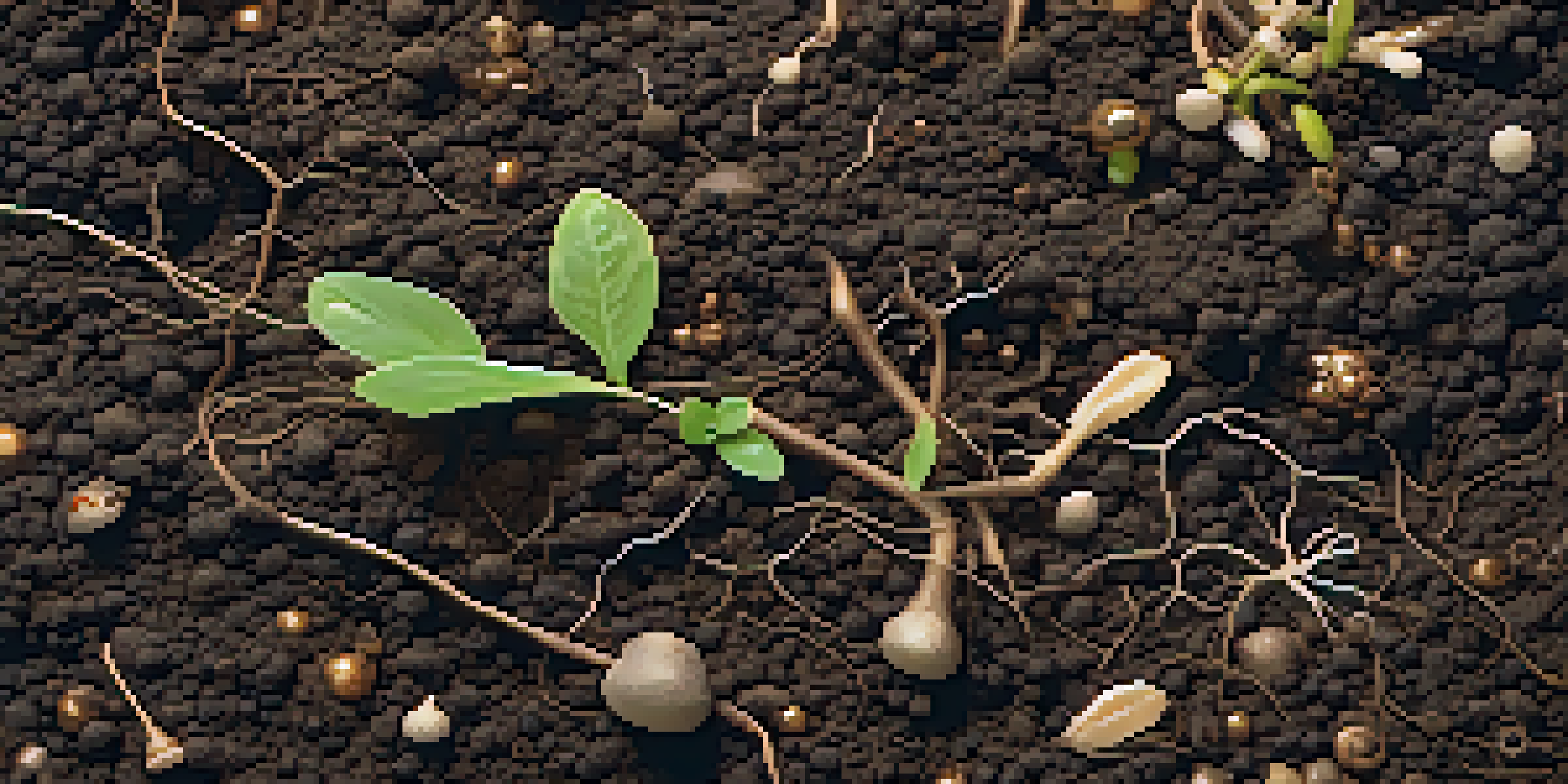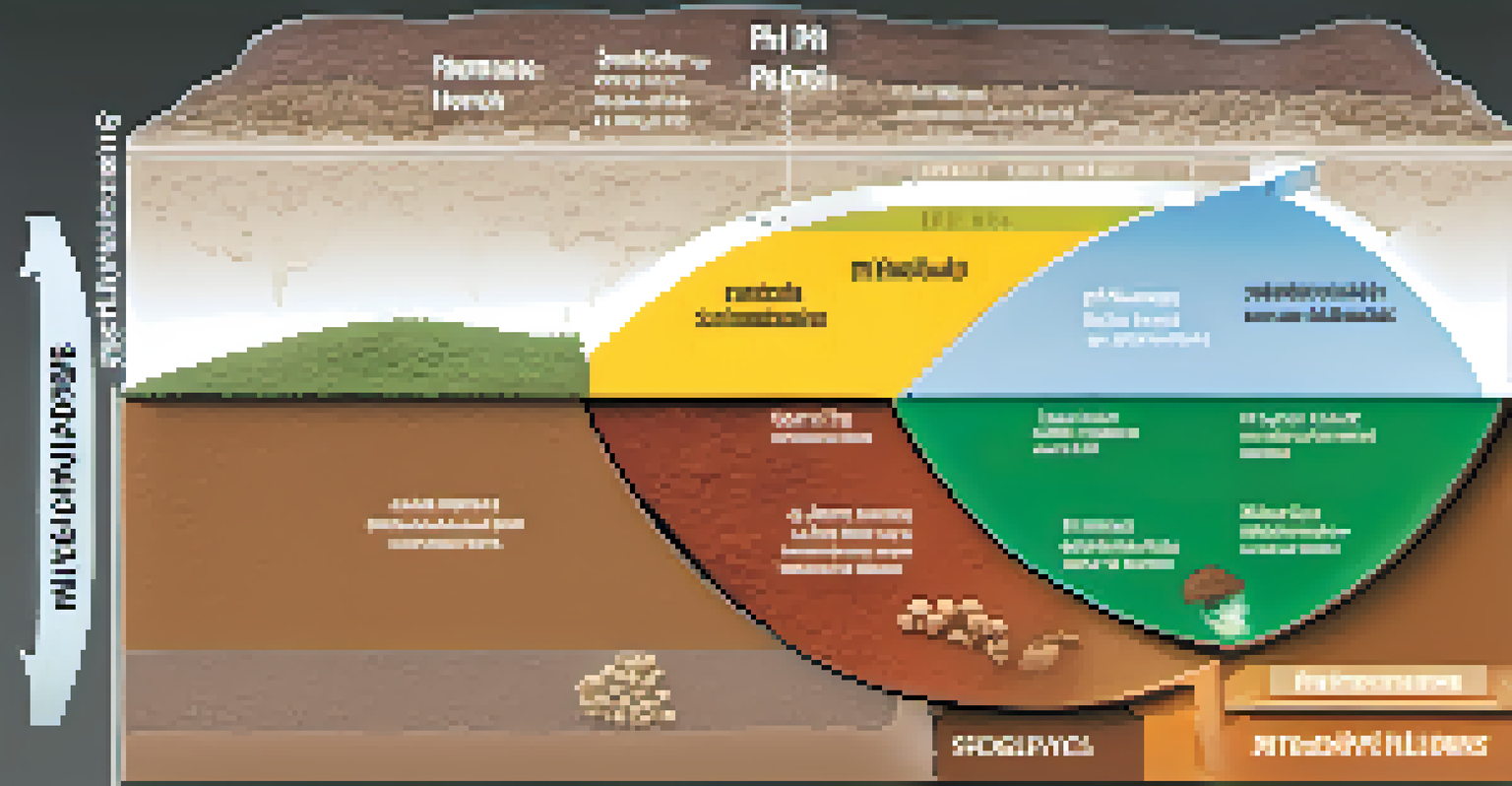How Soil Microbes Enhance Nutrient Availability for Plants

Understanding Soil Microbes and Their Roles
Soil microbes, including bacteria, fungi, and protozoa, are tiny organisms that pack a powerful punch in the ecosystem. They live in the soil and interact with plants, forming a complex web of life that is crucial for nutrient cycling. By breaking down organic matter, they release essential nutrients that plants need to thrive.
Microbes are the unsung heroes of our ecosystem, tirelessly breaking down organic matter to recycle nutrients essential for plant growth.
These microbes can sometimes be overlooked, but they are the unsung heroes of soil health. For instance, when organic matter like dead leaves and roots decompose, microbes help convert these materials into nutrients like nitrogen and phosphorus, making them accessible to plants. This symbiotic relationship is vital for sustainable agriculture and garden health.
Moreover, soil microbes improve soil structure, enhancing water retention and aeration. This means that not only do they help plants get the nutrients they need, but they also create a better environment for roots to grow. It's a win-win situation where both plants and microbes benefit.
The Role of Nitrogen-Fixing Bacteria
Nitrogen is a key nutrient for plants, essential for growth and development. However, most plants cannot use atmospheric nitrogen directly. This is where nitrogen-fixing bacteria come into play, converting atmospheric nitrogen into forms that plants can absorb and utilize.

These bacteria often form symbiotic relationships with legumes, such as peas and beans. In exchange for carbohydrates from the plant, they provide nitrogen-rich compounds, significantly enhancing the plant's nutrient profile. This mutualism not only benefits the plants but also enriches the soil for future crops.
Soil Microbes Enhance Plant Health
Soil microbes play a crucial role in nutrient cycling, breaking down organic matter to release essential nutrients for plant growth.
Interestingly, the presence of these bacteria can improve overall soil fertility, making it easier for other plants to thrive as well. This natural process reduces the need for synthetic fertilizers, promoting more sustainable farming practices that benefit both the environment and food production.
Mycorrhizal Fungi and Their Benefits
Mycorrhizal fungi are another type of soil microbe that has a profound impact on plant nutrition. These fungi form partnerships with plant roots, extending their hyphae into the soil to absorb water and nutrients more effectively than roots alone. This relationship is often referred to as a 'mycorrhizal network,' and it enhances nutrient uptake significantly.
The health of our soil is directly linked to the diversity of its microbial community, which in turn supports the life it nourishes.
Through this partnership, mycorrhizal fungi help plants access essential nutrients like phosphorus and zinc, which are often limited in soil. In return, plants provide these fungi with carbohydrates produced through photosynthesis, creating a beneficial exchange that supports both organisms.
Additionally, mycorrhizal networks can even connect multiple plants, allowing them to share nutrients and communicate stress signals. This interconnectedness fosters resilience in ecosystems and promotes healthier plant communities, showcasing the incredible teamwork present in nature.
Soil Microbes and Organic Matter Decomposition
The decomposition of organic matter is a vital process in nutrient cycling, and soil microbes are the key players in this process. As they break down dead plant and animal material, they release vital nutrients back into the soil, making them available for plant uptake. Without these microbes, organic matter would accumulate, and nutrients would remain locked away.
For example, when a leaf falls to the ground, microbes decompose it, releasing nitrogen, phosphorus, and other essential nutrients. This not only nourishes the soil but also improves soil structure and health, fostering an environment where plants can flourish.
Nitrogen-Fixing Bacteria Benefits
Nitrogen-fixing bacteria form symbiotic relationships with legumes, enriching soil fertility and reducing the need for synthetic fertilizers.
Furthermore, the byproducts of microbial decomposition also contribute to soil organic matter, enhancing its ability to retain moisture and nutrients. This creates a healthier soil ecosystem, supporting a diverse range of plant life and ultimately leading to more productive gardens and farms.
The Interplay Between Microbes and Soil pH
Soil pH is an important factor that influences nutrient availability, and soil microbes play a significant role in regulating this aspect. Certain microbes can help to acidify or alkalinize the soil, which affects the solubility of nutrients. For instance, some bacteria produce organic acids that lower soil pH, making nutrients like iron more available to plants.
Conversely, other microbial activities can help raise the pH, particularly in acidic soils. This balance is crucial because if the pH is too high or too low, plants may struggle to absorb essential nutrients, leading to deficiencies and poor growth.
Understanding how soil microbes influence pH can help gardeners and farmers manage their soil health more effectively. By fostering a diverse microbial community, they can create optimal conditions for nutrient availability, promoting healthier, more productive plants.
Microbial Diversity and Soil Health
Diverse microbial communities in the soil are essential for maintaining soil health and nutrient availability. Different types of microbes contribute unique functions, from nitrogen fixation to organic matter decomposition. This diversity enhances resilience, allowing the soil ecosystem to adapt to changes and stresses.
For example, a rich variety of bacteria and fungi can work together to break down a wide range of organic materials, ensuring that nutrients are continuously cycled back into the soil. This not only benefits individual plants but also supports overall ecosystem stability.
Diversity Boosts Soil Resilience
A diverse microbial community in the soil enhances resilience and nutrient availability, promoting healthier plants and ecosystems.
Promoting microbial diversity can be achieved through practices like crop rotation, cover cropping, and minimizing soil disturbance. By doing so, gardeners and farmers can create a thriving soil ecosystem that sustains plant health and productivity.
Practical Tips to Enhance Soil Microbe Activity
Encouraging soil microbes to thrive can significantly boost plant health and nutrient availability. One effective method is to add organic matter, such as compost or well-rotted manure, which provides a food source for these beneficial organisms. This not only enhances microbial activity but also improves soil structure and nutrient content.
Additionally, minimizing soil disturbance through practices like no-till farming can help protect the microbial community. Disturbing the soil can disrupt these organisms and their networks, reducing their effectiveness in nutrient cycling.

Lastly, incorporating diverse plant species in your garden or farm can support a wider range of soil microbes. This diversity enhances the overall health of the soil and promotes a robust nutrient cycling system, ensuring your plants receive the best possible nutrition.